Affiliate links on Android Authority may earn us a commission. Learn more.
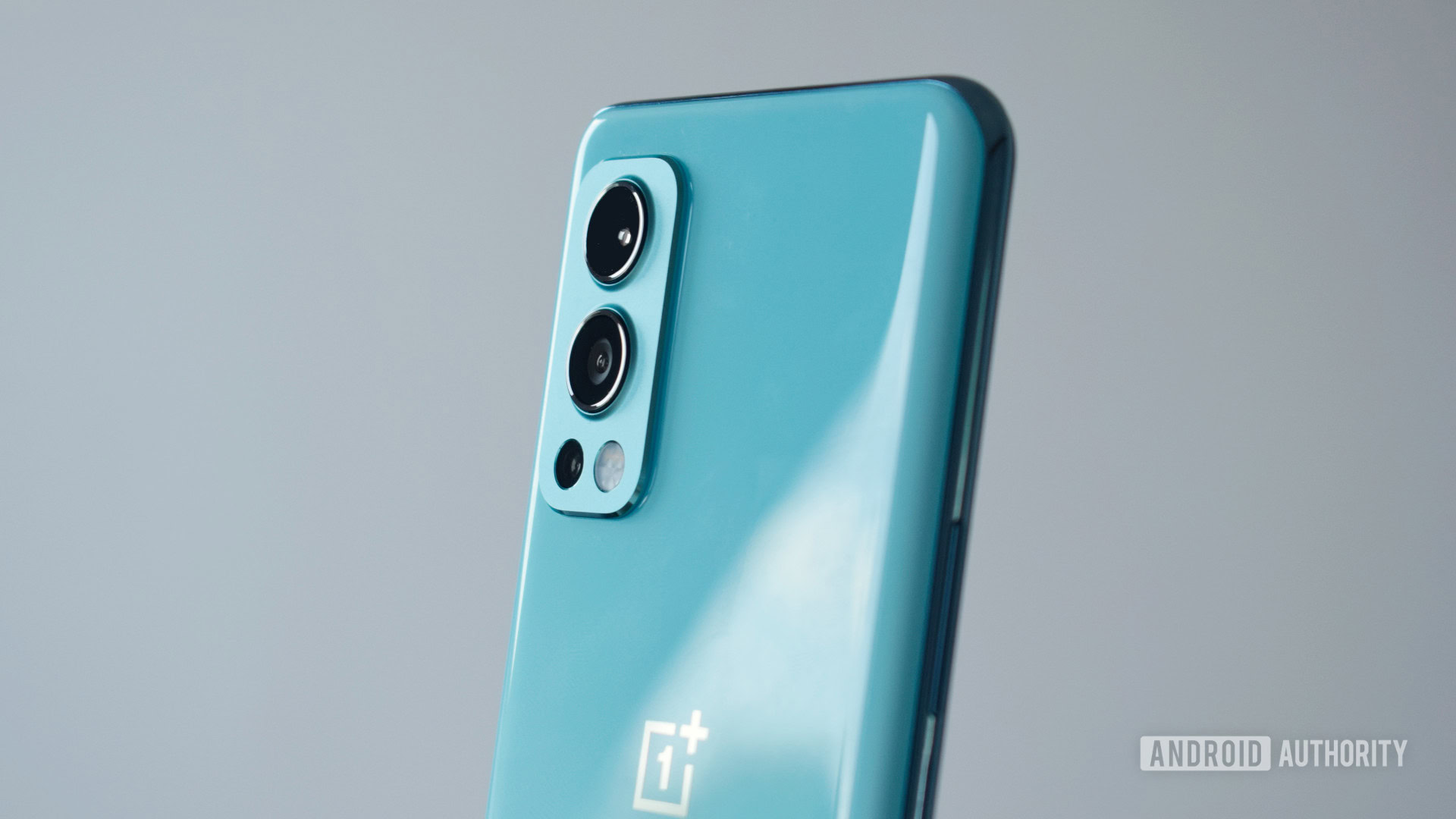
OnePlus Nord 2 review: Powerful hardware, ailing imaging
Published onJuly 22, 2022
OnePlus Nord 2
MSRP:
What we like
What we don't like
Our scores
OnePlus Nord 2
The original OnePlus Nord represented a pivotal moment in the company’s lineup. With the Nord, OnePlus set its sight on the lucrative mid-range segment, a market it had all but ignored with its flagship competing hardware. Its success in India and Europe (it never launched in the US) opened the floodgates for a series of largely forgettable Nord-branded phones that had little in common with their progenitor, and simply served to pad up the company’s entry-level options. With the OnePlus Nord 2, the company looks set to change that.
While the original Nord was a fairly well-equipped package, competitors have significantly narrowed the gap since then. In Android Authority‘s OnePlus Nord 2 review, we see if the company has taken enough of a leap to forge its path through a sea of worthy alternatives, or if it sinks under the weight of expectation.
What you need to know about the OnePlus Nord 2
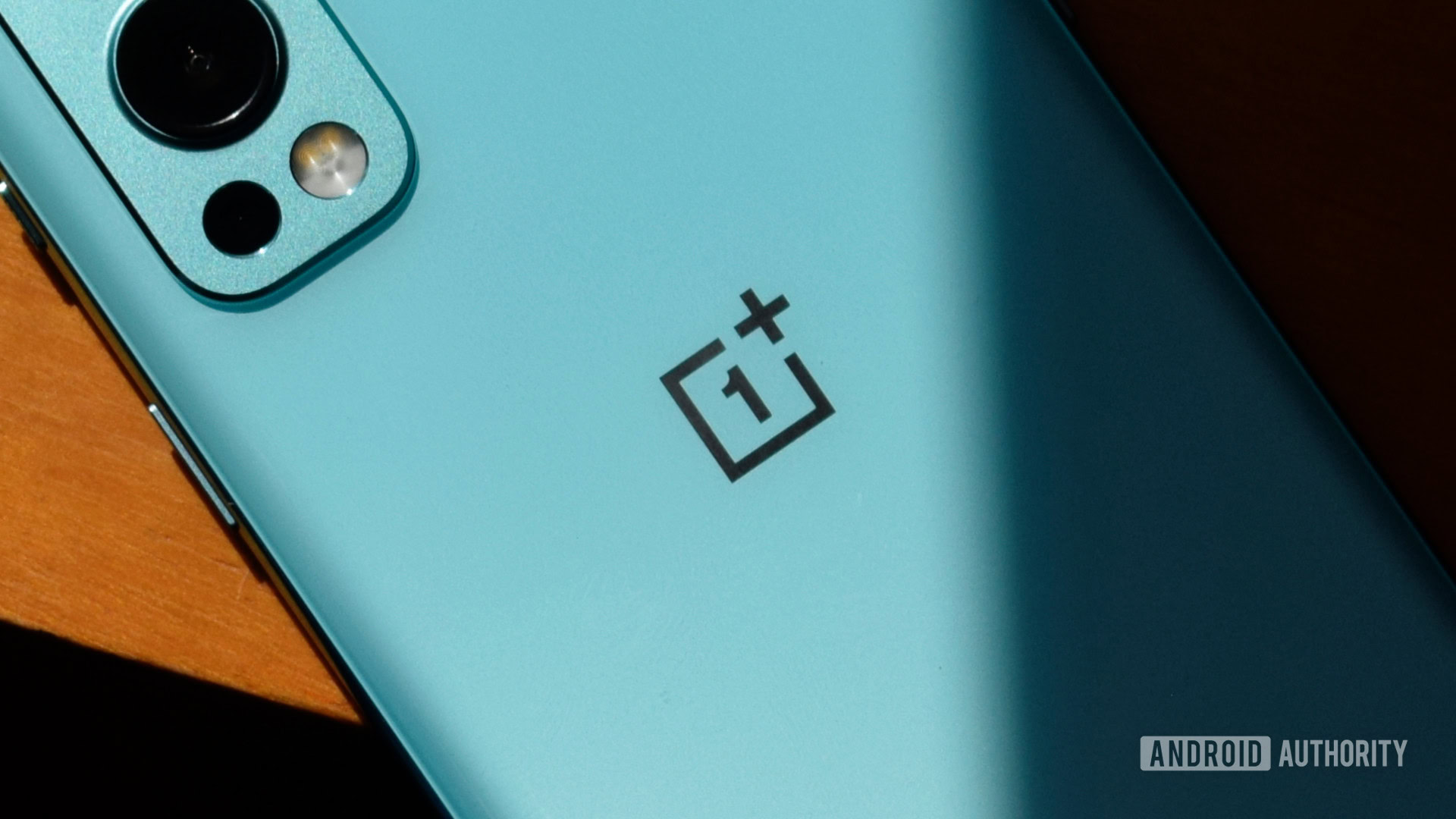
- OnePlus Nord 2 (6GB/128GB): Rs. 27,999 (~$375)
- OnePlus Nord 2 (8GB/128GB): £399/€419/Rs. 29,999
- OnePlus Nord 2 (12GB/256GB): £469/€519/Rs. 34,999
The OnePlus Nord 2 launches right around the one-year anniversary of the company’s first mid-range smartphone, the OnePlus Nord. This time around, the phone is aimed at bridging the divide between the more budget-conscious options, and the company’s high-end OnePlus 9 series. To that end, the OnePlus Nord 2 sports a design that is derived almost entirely from the OnePlus 9 with suitable omissions to hit the price bracket. After the middling and confused Nord CE, the OnePlus Nord 2 hopes to be a worthy successor to the original Nord with specs boosts to the processor, cameras, and charging speeds.
The phone is priced starting at Rs. 27,999 (~$375) for the 6GB RAM and 128GB storage variant. That version, however, is exclusive to India. In the UK and elsewhere in Europe, the phone starts from £399/€419 (~$494) for the version with 8GB of RAM and 128GB storage. The phone will retail via operators like O2 and Three in the UK, as well as John Lewis, Amazon, and the OnePlus store. Buyers in India can pick up the phone via Amazon or the OnePlus store. A further variant with 12GB RAM and 256GB storage is also available in all regions. Like its predecessor, OnePlus has not announced plans to bring the Nord 2 to North America.
Read more: Everything you need to know about OnePlus
OnePlus is ranging the Nord 2 in a variety of colors including Gray Sierra, Blue Haze, and Green Wood. We tested the Blue Haze variant. The phone includes staples like a TPU case in the box and has a pre-applied screen protector. In France, the phone will include a pair of earphones in the packaging, while India will get a sticker as well as a Red Cable Club card.
Design: It’s a OnePlus, no doubt
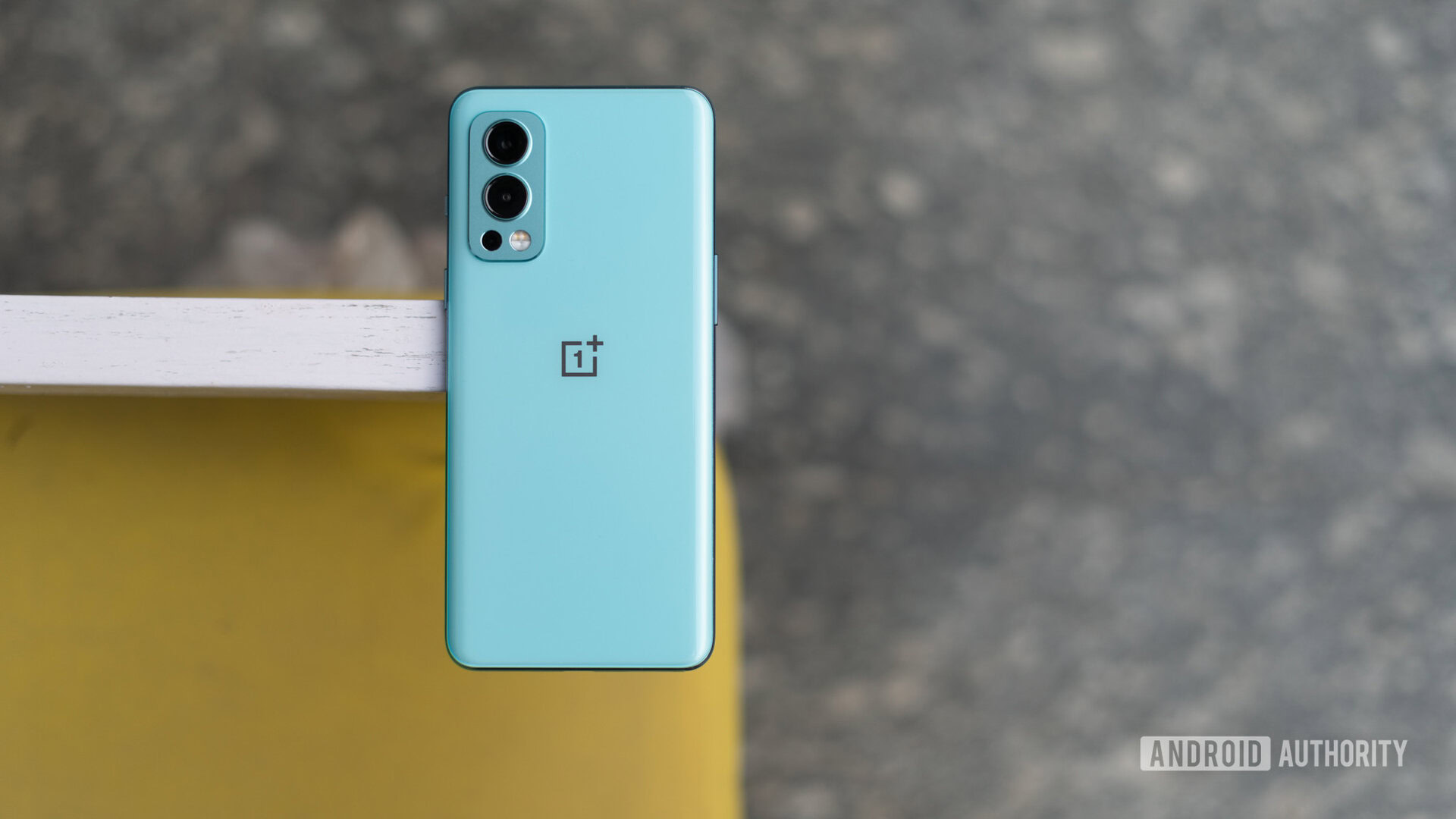
- Gorilla Glass 5 (front and back), plastic mid-frame
- 158.9 x 73.2 x 8.25mm
- 189g
- In-display fingerprint reader
- Splash resistant
- Three-way alert slider
- Stereo speakers
- Gray Sierra, Blue Haze, Green Wood
If the original OnePlus Nord was all about creating a new market for the brand in the mid-range segment, the OnePlus Nord 2 is all about consolidation and cementing brand identity — one that extends from top to bottom and engenders familiarity. And that starts with design.
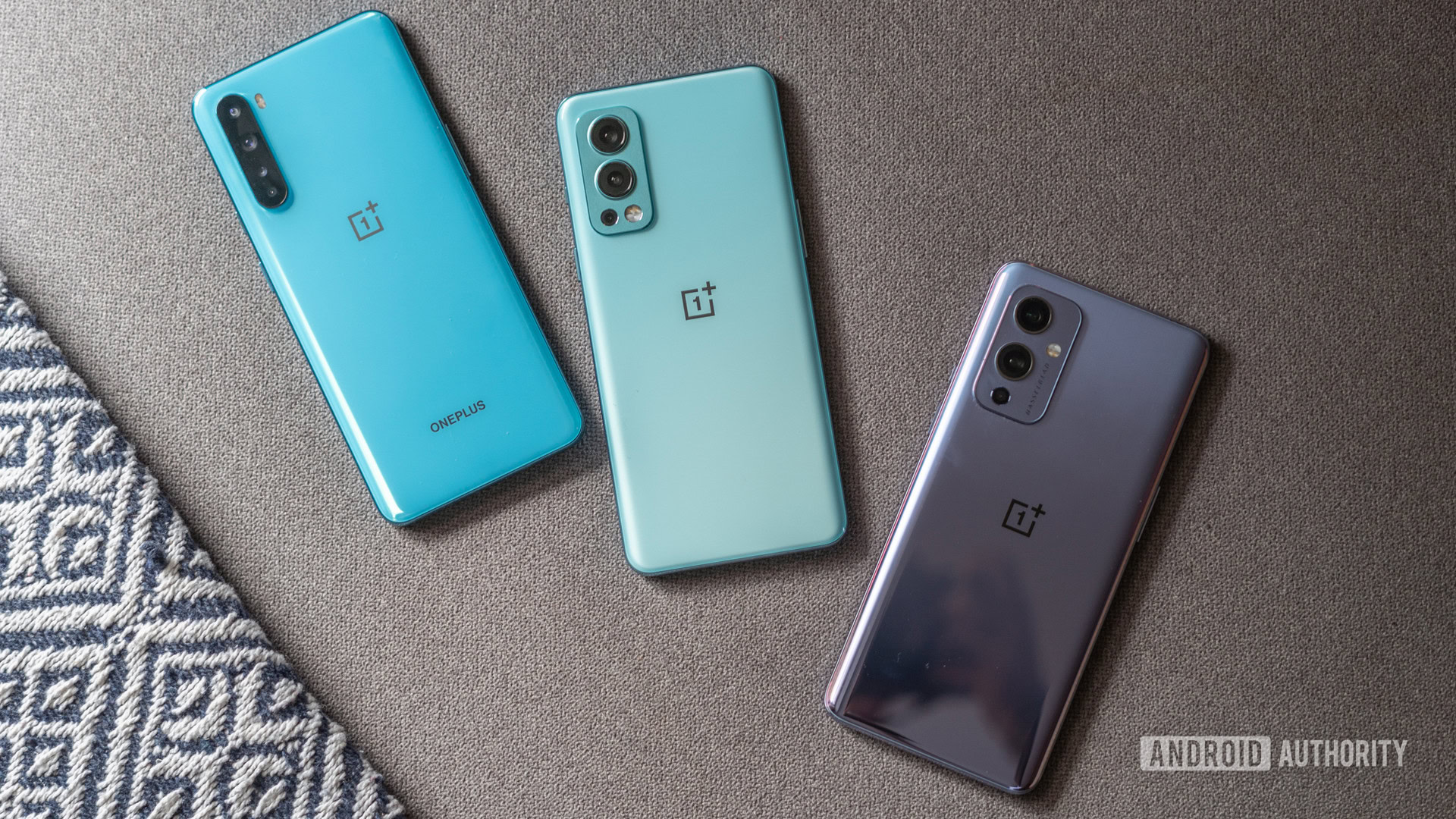
The design of the OnePlus Nord 2 channels the clean lines and smooth curves of the OnePlus 9 and the phone fits like a glove in the current OnePlus line-up.
Gripping the phone, the upgrade in build quality over the first generation Nord is obvious. The Gorilla Glass 5 back curves and flows seamlessly around the edges and wraps into a plastic mid-frame. The camera module too is in line with the OnePlus 9 series and includes two raised sensors flanked by a symmetric array of LEDs and the monochrome shooter. The paint finish on the Blue Haze variant is particularly nice to look at, and fingerprints were no issue at all.
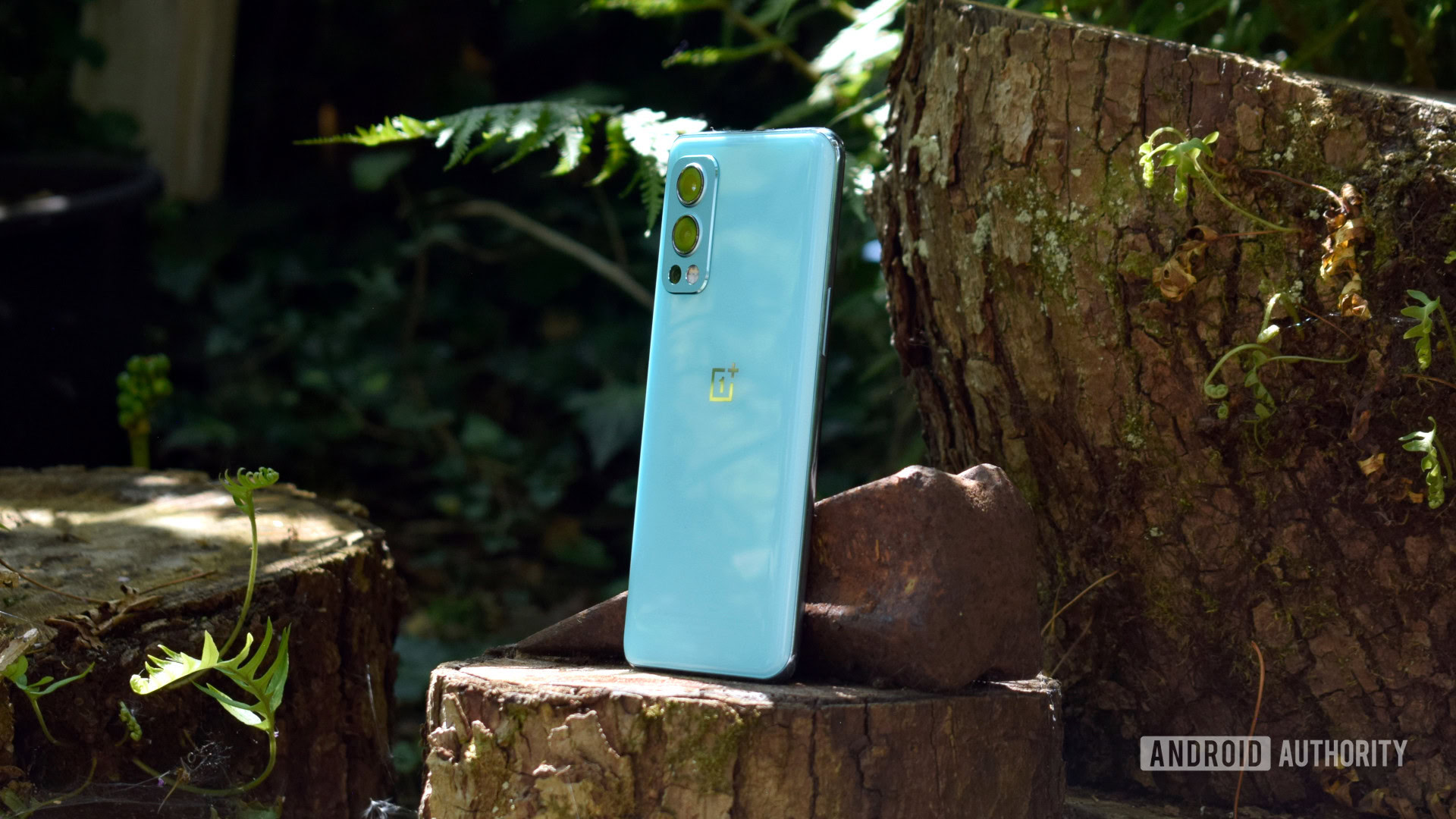
Unlike the OnePlus Nord CE and Nord N series devices like the Nord N200, the Nord 2, thankfully, retains the brand’s signature alert slider. The three-step key is an essential part of the OnePlus experience and is perfectly placed to quickly silence calls and notifications. You can also long press the power button to activate Google Assistant.
The excellent ergonomics are let down by a sharp-edged USB-C port and hollow haptics.
Coming from a larger phone, the size of the OnePlus Nord 2 stood out to me for its one-hand usability. This is a phone that fits perfectly in the palm of the hand and typing on it is quite enjoyable. Unfortunately, the haptics are a bit of a letdown and quick keypresses leave a hollow sensation.
Elsewhere, the fingerprint reader is by and large the same as on the original Nord. It’s quick, mostly reliable, and rarely failed to work in my time with the phone. It has face unlock too, but it’s software-based and far less secure as a result.
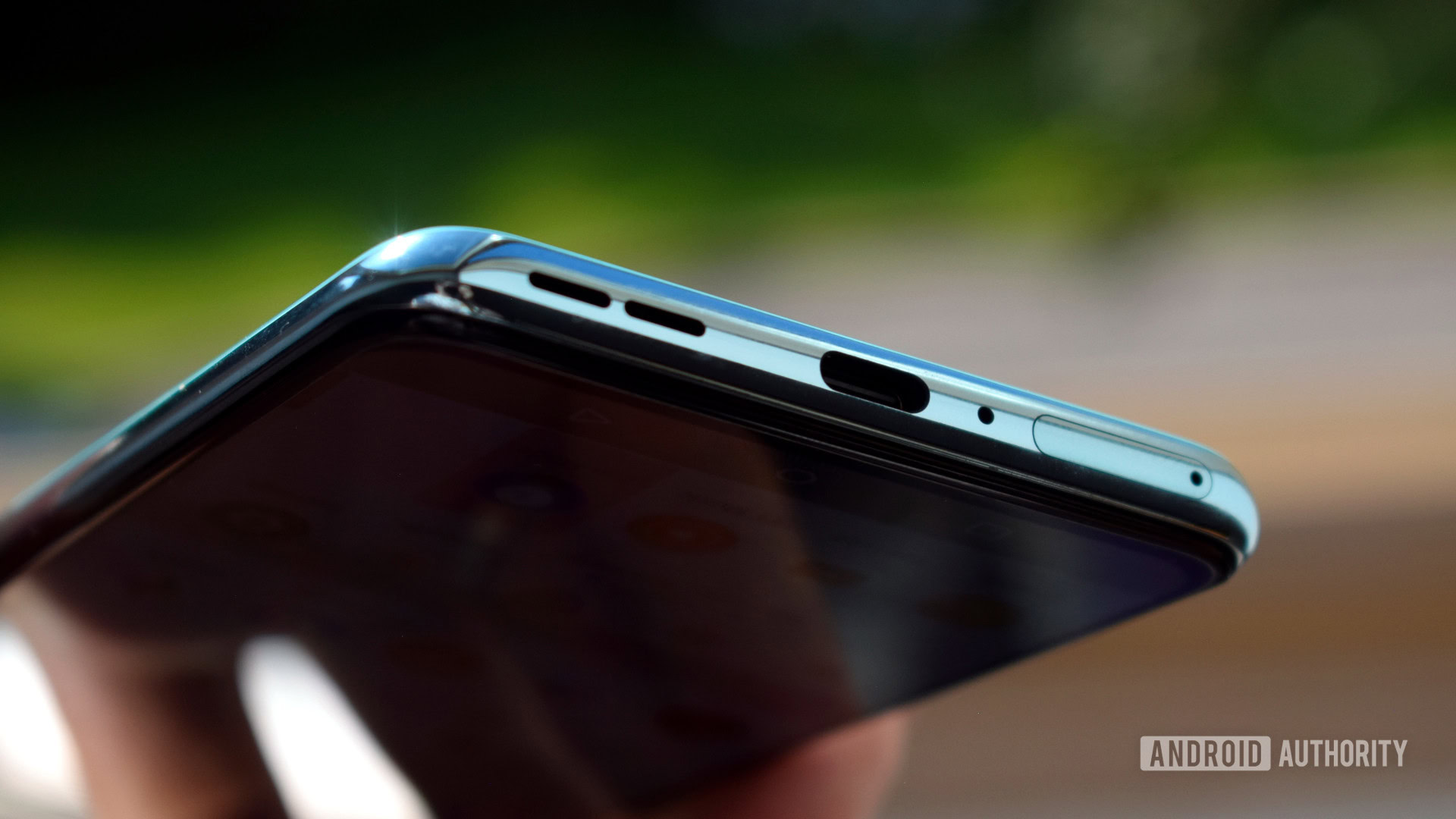
For all its refinement, I observed a peculiar issue with the design here. The cutout for the USB-C port is too sharp. If like me, you tend to rest the phone on your pinky finger while using it, you’ll very quickly realize that the frame cuts into your skin.
Unfortunately, the phone lacks any IP rating whatsoever so you’ll want to be careful near a pool. With brands like Xiaomi including basic dust and water resistance even in much more affordable hardware (not to mention Apple’s iPhone SE), this is a big miss for OnePlus.
The speakers are perfect for a day by the pool, the lack of an IP rating is not.
The dual speakers on the OnePlus Nord shine through with their clarity and ability to keep output clean and rattle-free even at high volumes. There’s a depth to the sound though you won’t be getting much bass. The slight imbalance in favor of the bottom-firing speaker aside, these are some of the better speakers I’ve observed lately. With the OnePlus Buds Pro being introduced right alongside the Nord 2, it’s clear that the company wants to upsell its true wireless earphones. That said, the lack of a headphone jack is a baffling omission after the company made such a big deal about the return of the audio jack on the recently launched OnePlus Nord CE.
Overall, the OnePlus Nord 2 does a good job of distilling the modern OnePlus design blueprint into a budget phone while crafting a phone that is usable. It looks very familiar, but that’s by design and unlike the realme/OPPO clones of late from OnePlus, the Nord 2 offers a sense of premium-ness both in day-to-day usability as well as look and feel. However, the competition is bending over backward to offer more to buyers, and it makes the lack of bonus features like an IP rating stand out all the more.
Display: Plenty good
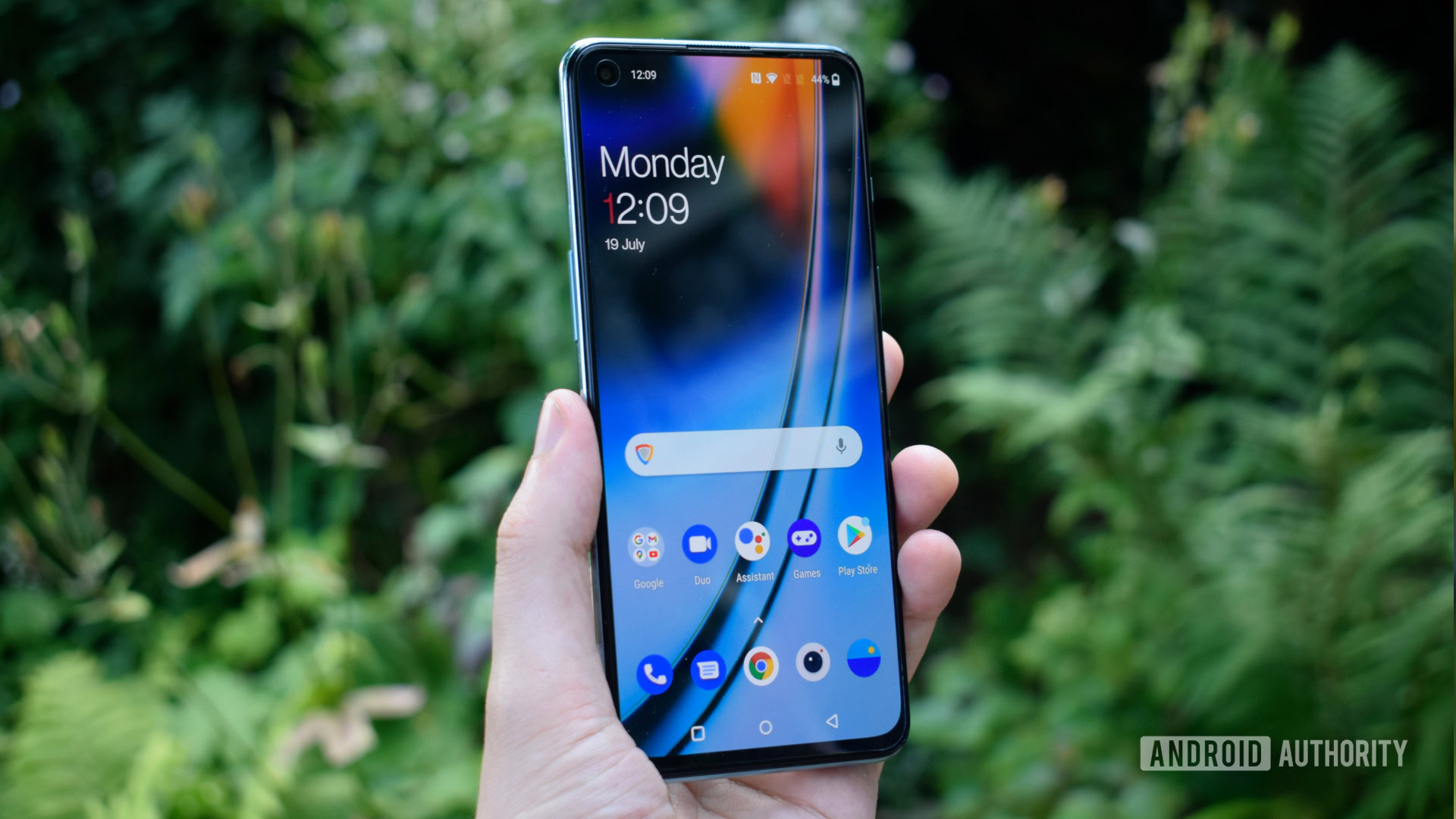
- 6.43-inches Fluid AMOLED with punch-hole
- 2,400 x 1,080 resolution
- 410 pixels per inch
- 20:9 aspect ratio, 90Hz refresh rate
Personally, I’ve always liked the panels on OnePlus phones, and the Nord 2 is no exception. It looks incredible to the eye and backs it with accurate colors. The default color calibration is set to push contrast levels more than usual but it takes a quick toggle to set it to the Gentle setting that I much prefer. Brightness levels are more than adequate for visibility under direct sunlight, though it bears mentioning that adaptive brightness continues to be painfully inadequate across the OnePlus portfolio. You may need to adjust it manually far more than you’d hope.
The phone supports HDR 10, and viewing compatible content on YouTube was a really good experience. The Netflix app hasn’t been updated to support HDR on the Nord 2 just yet, but if the original Nord is anything to go by it should arrive eventually. On the topic of multimedia content, the significantly smaller punch-hole compared to the pill-shaped original Nord is a lot more visually appealing and a lot less intrusive while watching a YouTube video or movie.
Read more: What does high refresh rate mean? Everything you need to know
OnePlus has tossed in a few extra software options to enhance video playback. These mostly apply to local playback, but also include YouTube and MXPlayer support. There’s an AI Resolution mode that improves perceived video quality. It’s a bit hit or miss and I kept the setting toggled off for the most part.
Finally, there’s high refresh rate support, albeit capped at 90Hz. What’s here is good and the OnePlus Nord 2 lets you switch between a 60Hz and 90Hz mode with the latter enabled out of the box. The mode dynamically switches the refresh rate based on content and adds that extra bit of buttery smoothness to the already great Oxygen OS. That said, the lack of 120Hz support is a bit disappointing considering its recent proliferation among recent budget devices. The step-up from 90Hz to 120Hz isn’t nearly as huge as the upgrade from 90Hz, but it is noticeable if you use both side-by-side.
Performance: A beast restrained
- MediaTek Dimensity 1200 AI processor
- Mali-G77 MC9 GPU
- 6/8/12GB RAM
- 128/256GB storage
The OnePlus Nord 2 is the latest to join the fresh crop of MediaTek Dimensity toting mid-rangers. The Taiwanese company’s range-topping Dimensity 1200 chipset has been a bit of a revelation and is quickly becoming a popular option amongst phones balancing performance and value. The OnePlus Nord 2 is using a bespoke version of the chipset with an enhanced focus on artificial intelligence, hence the AI in the name.
Daily performance is as good as you’d expect from a phone of this caliber. Simply put, the OnePlus Nord 2 flies in daily tasks with zippy app startups and a fluid interface. Very rarely I noticed a choppy frame, but I’d chalk this up to minor pre-launch bugs.
Unlike the OnePlus 9 series, the Nord 2 gives you the option of full-throttle performance.
Before we dive any further into the performance analysis, there’s one aspect of the OnePlus Nord 2 that bears mentioning. While the OnePlus Nord 2 runs cool and comfortable for most daily tasks in its standard performance profile, following the OnePlus 9 Pro’s performance throttling, the company has added a new performance toggle mode to the Nord 2 that unlocks the full potential of the chipset. The high-performance mode predictably increases battery consumption and heat, and boy does the OnePlus Nord 2 run hot!
The high-performance mode shows up as a very noticeable uptick in our performance testing with graphics, displaying a 15-20% improvement. However, day-to-day usage benefits were far more pedestrian.
In our very own Speed Test G test, the phone blazed through the benchmark with an overall time of one minute and 46 seconds. That’s a huge improvement over the two minutes and 21 seconds timed by the original OnePlus Nord. Putting the phone in high-performance mode further revs up the engines and brought the overall time to one minute and 31 seconds. That’s within spitting distance of the OnePlus 8 Pro, and ahead of the Samsung Galaxy Note 20 Ultra. That blistering fast performance is, however, accompanied by an extortionate amount of heat and in its current state, using the high-performance mode is a recipe for disaster or a very quick battery death.
The phone ships with ample storage, up to a whole 256GB if you need it, and it is of the fast UFS 3.1 variety so there are no real chokepoints in the hardware. There’s no expandable storage, but the 128GB minimum is a healthy upgrade over the original Nord’s base 64GB model.
The Nord 2 delivers a perfectly good gaming experience too. I played a few rounds of Call of Duty Mobile and the frame rate remained silky smooth at a nearly locked 60fps both in standard and high-performance mode, with some caveats. In the standard performance mode, the CPU frequently spiked all the way to 99% usage in particularly action-packed zones, GPU usage too hovered well above the 50% mark.
The high-performance mode gives a boost in gaming performance, but at the cost of extreme heat and rapid battery drain.
Switching to high-performance mode drastically reduced CPU usage with it staying around the 35% mark for most of the gameplay. This, however, indicates pretty severe CPU throttling in the standard mode. It shouldn’t affect most buyers who will likely stay within the standard performance profile, but it’s worth noting for anyone looking to buy the phone specifically for gaming.
The blazing-fast performance is accompanied by equally fast network connectivity. The OnePlus Nord 2 supports 5G connectivity and the Wi-Fi 6 standard. It doesn’t support mmWave 5G but considering it’s not intended for the US market that’s a non-issue. The OnePlus Nord 2 ships with robust band support even in India which should quell a longstanding gripe with the company’s 5G enabled handsets. That said, I wasn’t able to test out the feature since the 5G spectrum hasn’t rolled out in India just yet.
Battery: Long-lasting, under the right conditions
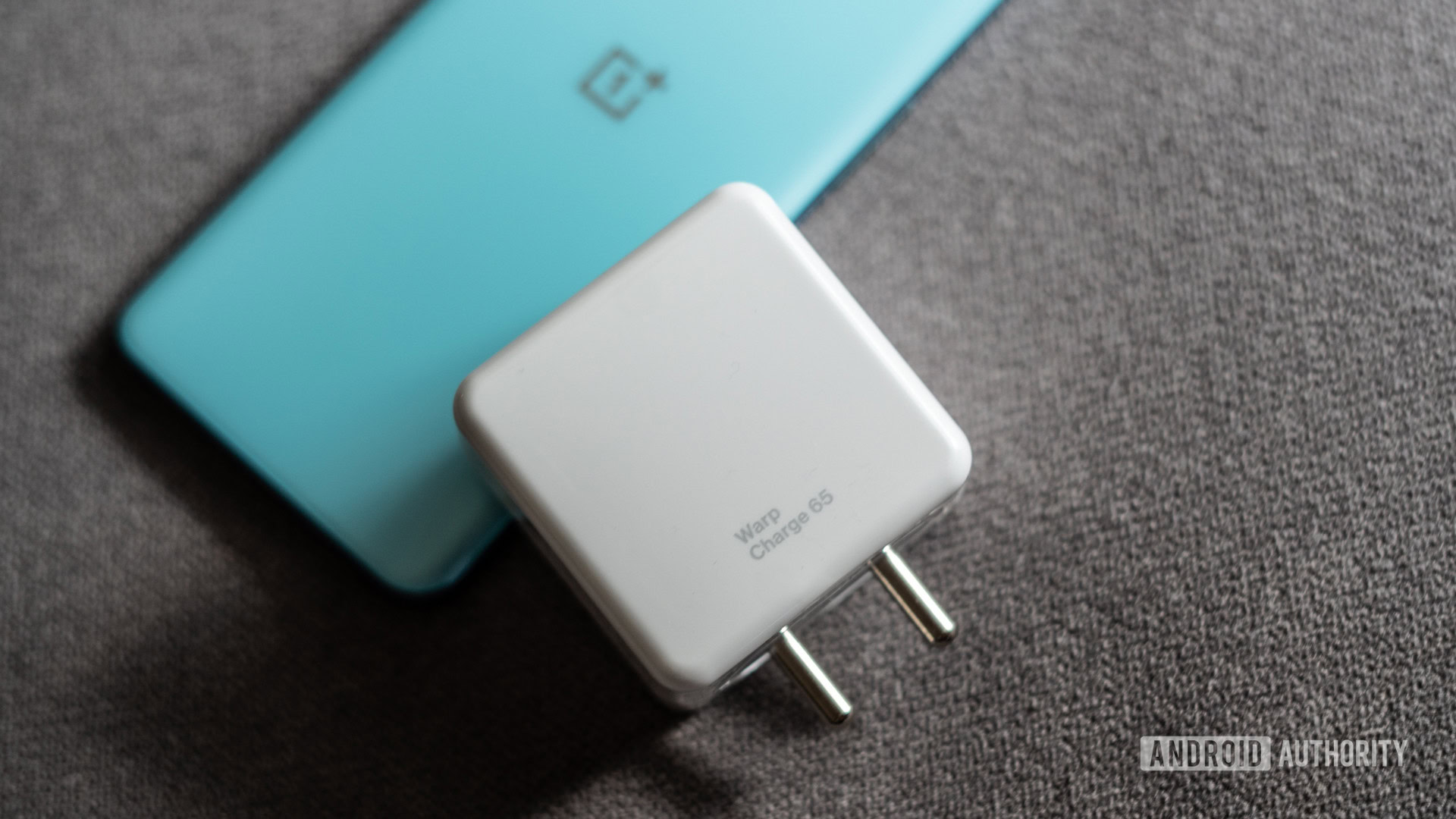
- 4,500mAh battery
- Warp Charge 65W wired charging
- No wireless charging
Battery life on the OnePlus Nord 2 varies drastically depending on the performance mode you are in. We’ll stress this again: you really don’t want to be using the high-performance mode if you want any semblance of decent battery life. On the Indian variant I tested, I observed the battery dropping percentage points by the minute while in high-performance mode. My colleague Rob Triggs’s UK model didn’t suffer quite so badly, but he too remarked that the battery drain was significantly higher when in the boosted profile.
A full day of use and then some should be no trouble for the OnePlus Nord 2.
Of course, the standard profile is the mode I expect most users to be in, and it has all the OnePlus tweaks and optimizations to prolong battery life. I’ve had the phone for just about five days so adaptive battery mode optimizations are still kicking in. Additionally, running a boatload of benchmarks, testing suites, and changing settings don’t entirely indicate real-world battery life. However, with the display set to 90Hz, I can still manage a full day of use with ease — not bad.
Coupled with the larger 4,500mAh battery, users can realistically expect a day and a half of use out of the OnePlus Nord 2. Additionally, charging speeds too get a massive upgrade over the 30W supported by the original Nord. This time around, the phone gets the same blistering fast 65W charging as the rest of the OnePlus 9 series, and I clocked just under 35 minutes to go from zero to 100. It also supports ~18W USB Power Delivery as a backup if you don’t have a Warp Charge adapter handy. There’s no wireless charging to speak of, but that’s a rarity in this price bracket.
Related: The best phone charging accessories
Camera: Let down by iffy software
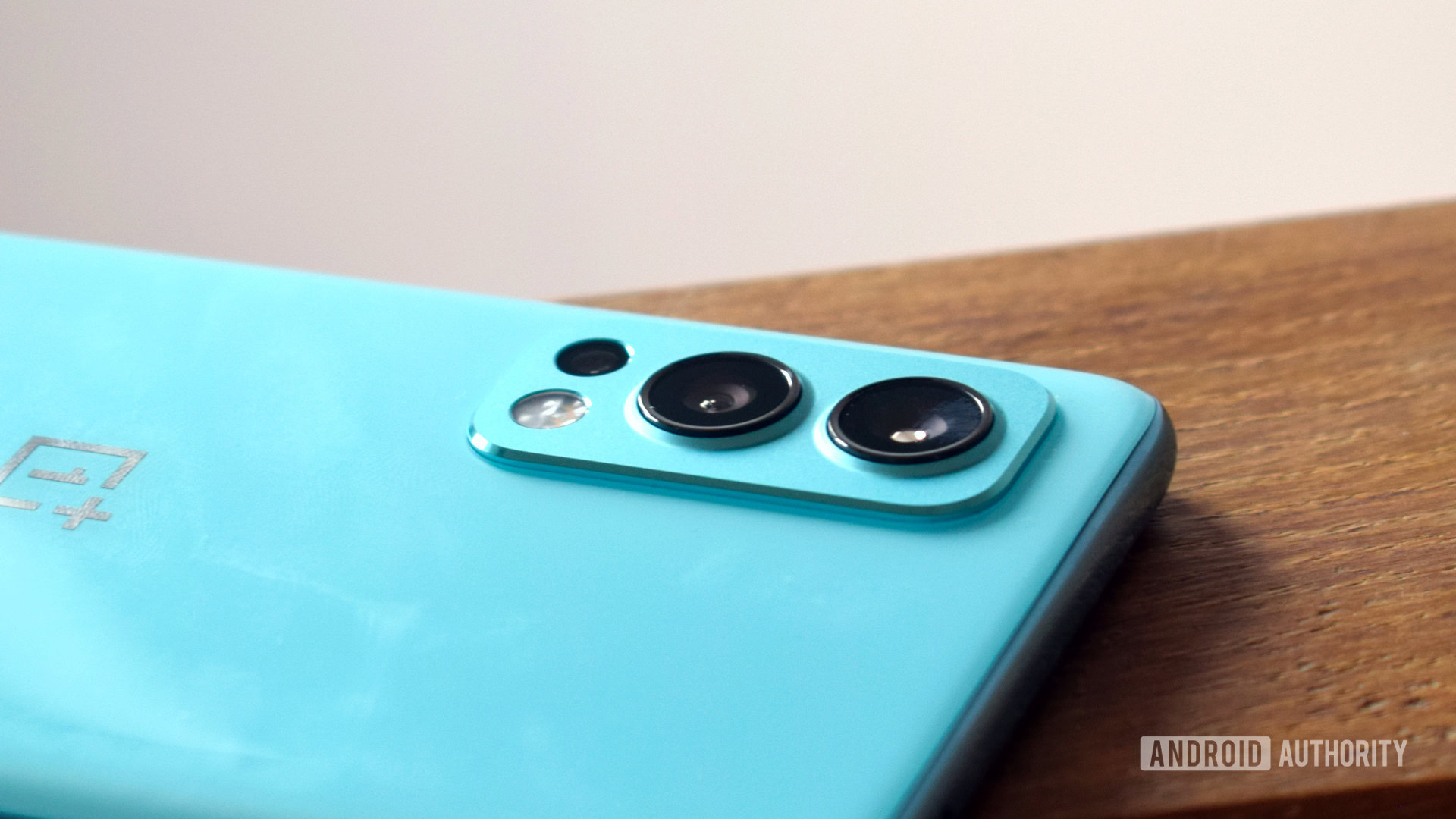
- 50MP Sony IMX 766, OIS (f/1.88, 1.0μm)
- 8MP ultra-wide (f/2.25, 119.7-degree FOV)
- 2MP monochrome lens (f/2.5)
- 32MP front IMX615 (f/2.5)
- 4K at 30fps video
The camera app on the OnePlus Nord 2 gets a rejig thanks to the new Color OS-based software build. Keen-eyed users will notice a slight change in the location of settings, as well as some classic OPPO features like a dual-view video mode and a range of AI enhancement options. It’s a straightforward user experience, but I’m not a big fan of hiding away essentials like resolution and aspect ratio control under a swipe away panel.
Coming to the actual image quality on offer, it’s the classic OnePlus story all over again. Images come out looking pretty inconsistent and the camera app has all of the same bugbears that plague OnePlus phones at launch. The software here tends to seriously push blues and greens to create a more contrasty image. The heavily saturated image with an extra topping of post-processed sharpening might be appealing to some users, but is definitely not accurate.
Coupled with that heavy push of contrast, the lacking dynamic range is all the more visible and you will often be left with crushed details in darker, shadow regions. This is despite packing the same excellent 50MP sensor as on the OnePlus 9 and OnePlus 9 Pro.
It’s not just the primary camera either. The issue is consistent across both the standard and ultra-wide cameras and you can barely make out the details on the trees in the distance. The issue gets further exacerbated with falling light.
The Nord 2's cameras are inconsistent and carry all the same bugbears that plague OnePlus phones at launch.
The samples above also highlight another issue — inconsistent color science. Switching from ultra-wide to the standard wide-angle lens, there is a prominent switch in the colors. Switching to the software zoom, once again you will notice a slight change in color. OnePlus had more or less fixed this issue with the OnePlus 9 Pro so it is disheartening to see the brand go back to square one.
Elsewhere, the sky and grass in the ultra-wide image have much higher saturation levels than in the image from the primary shooter. Neither is accurate.
HDR performance too is rather middling. In the first image (shot on the UK unit), the terribly oversaturated blues and greens might as well have been shot at the bottom of the ocean. Close examination also reveals haloing around the edges of objects. The shots aren’t terrible, but you expect far better from a device of this caliber.
Coming back to the ultra-wide sensor, the 8MP camera simply isn’t able to resolve a whole lot of detail. There’s not much sharpness and evidence of heavy noise reduction can be seen the moment you crop into the frame. Coupled with the aforementioned concerns with dynamic range and crushed details, it’s just not a very good look for OnePlus.
Meanwhile, the 2x zoom is effectively a digital crop from the primary sensor. It is usable in a pinch, but I wouldn’t recommend pushing it any further due to the significant deterioration in quality.
The camera sensors aren’t very usable in low-light either, unless you use the built-in night mode called Nightscape. Results using night mode are rather good despite some loss of detail and will allow you to capture a usable shot. But, that’s from the primary camera. The ultra-wide sensor, on the other hand, is an absolute no-go in less than perfect lighting.
The imperfections continue in the portrait mode where the software really struggles to gauge depth and accurately segment out of the object. The bokeh effect is all over the place, and it is astounding to see OnePlus mess this up so bad. I’ve seen better results from phones at half the price of the Nord 2.

Selfies on the OnePlus Nord 2 are a bit of a mixed bag as well. For one, I’m really disappointed by the loss of the ultra-wide-angle front-facing camera from the original Nord. Despite image quality concerns, it was a great addition for capturing larger groups. But I digress, the 32MP sensor here does an okay job but continues with the OnePlus theme of inconsistent performance. There’s a decent amount of detail, but colors can often look incredibly washed out. The phone does have its occasional moments of brilliance when it will spit out a picture-perfect selfie, but don’t count on it.
Unlike still photography, videos from the OnePlus Nord 2 aren’t too bad. Videos top off at 4K/30fps, but the actual quality is quite decent with effective stabilization and rich colors. The lack of a 60fps mode, however, is a very odd omission for a phone as pricey as the Nord 2.
You can check out the full-resolution camera samples in this Google Drive folder.
Software: Oxygen OS with a dash of Color (OS)
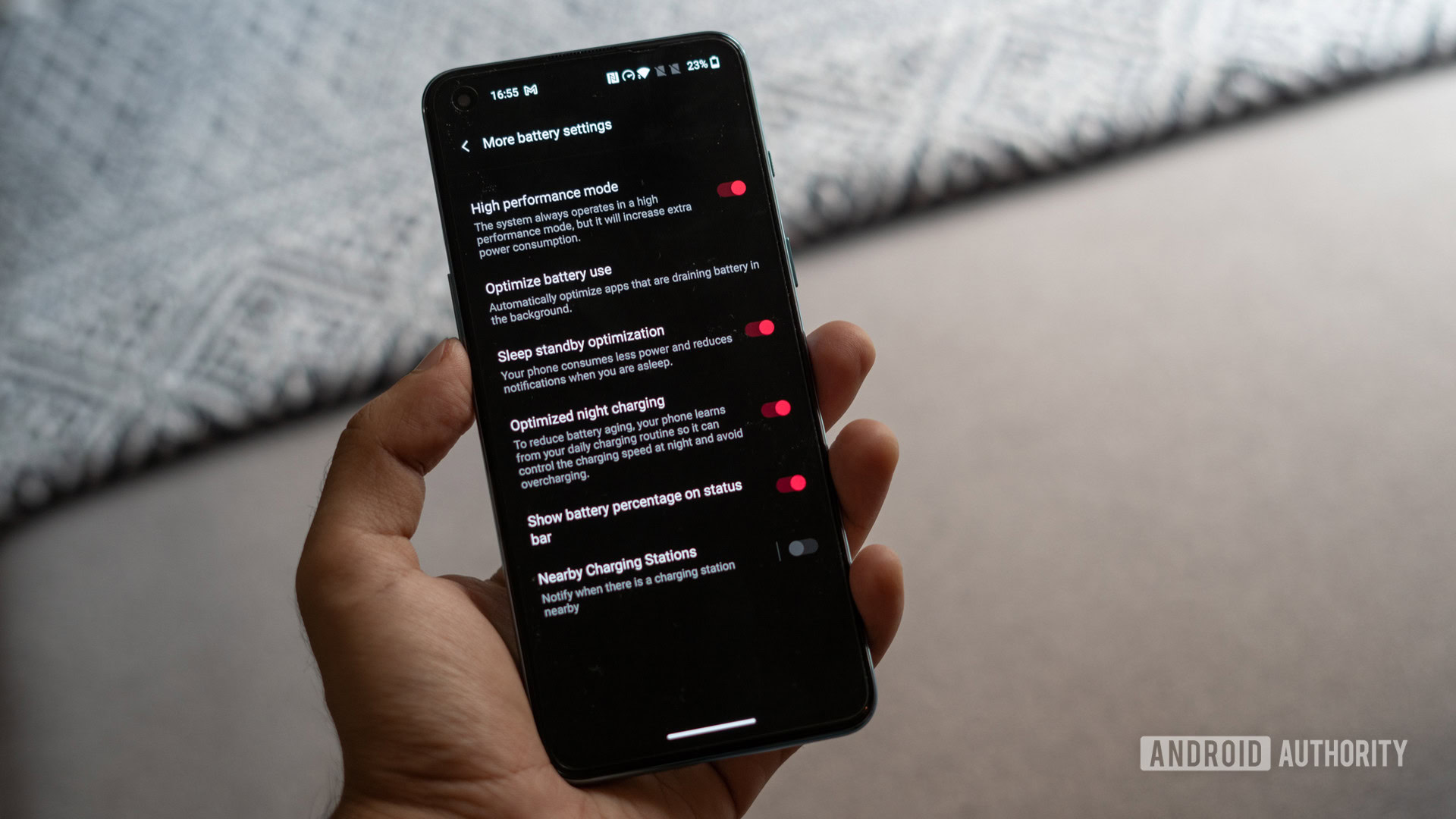
- Android 11
- Oxygen OS based on Color OS 11.3
- Two years of updates, three years of security patches
Oxygen OS on the OnePlus Nord 2 is pretty much the same user experience we’ve come to like over the years. It’s no stock Android, but the pretense of a near-stock experience with careful feature additions all-around work out well in practice. It really helps that the software feels fluid and fast.
For fans of customizing the interface, Oxygen OS affords a wide range of options including icon packs, the ability to switch fonts, and even the animation for the fingerprint scanner. It’s quite convenient all-around, though I wouldn’t mind the ability to add a notification ring around the punch-hole camera. A new addition is a Canvas mode for the ambient display. The feature uses AI to pull out an outline from a photograph and seamlessly transitions between the ambient mode and home screen.
There’s not much that has changed here despite the transition to the Color OS codebase. In fact, the only major change I observed over previous OnePlus devices was the revamped battery settings page. I really like the glanceable information on offer here, as well as the actionable help for instances when you want to diagnose an errant app consuming too much power. The battery settings page is also where you will find the high-performance mode toggle. The fact that the option is so far hidden away really drives home the notion that OnePlus isn’t too keen on you using it.
OnePlus' software promise for its budget phones falls behind the likes of Samsung and Google.
Newcomers to the OnePlus ecosystem will be welcomed by nice to have features like a Zen Mode that lets you zone out from the distractions on your phone. In fact, the OnePlus work-life balance suite of features comes in clutch to maintain, well… balance between work and office app notifications and more personal pings. The other stand out is the minimal bloatware, minus a few OnePlus apps as well as Spotify and Netflix. Users in India, however, have to contend with a persistent notification for the company’s Red Cable Club.
Over to software updates, the transition to the Color OS codebase has spelled good news for OnePlus flagship buyers, but sadly not in this case. While the full-fat flagships are now promised three major updates, the Nord series is promised two, in addition to three years of security updates. Launching on the cusp of the Android 12 launch, it is a bit of a cop-out that the upcoming update will be one of two major updates promised.
OnePlus Nord 2 specs
| OnePlus Nord 2 Specs | |
|---|---|
Display | 6.43-inch Fluid AMOLED 2,400 x 1,080 resolution at 410ppi 20:9 aspect ratio 90Hz display refresh rate |
Processor | MediaTek Dimensity 1200 AI |
GPU | Arm G77 MC9 |
RAM | 6GB (India only), 8GB, or 12GB LPDDR4X |
Storage | 128GB or 256GB UFS 3.1 |
Power | 4,500mAh battery Warp Charge 65 (65W wired charging) No wireless charging |
Cameras | Rear: - 50MP main (1.0µm, ƒ/1.88, OIS) - 8MP ultra-wide (119.7-degree FoV, ƒ/2.25, EIS) - 2MP monochrome (ƒ/2.5) Front: - 32MP single (0.8µm, ƒ/2.45, EIS) |
Video | 4K at 60FPS recording 1080p at 30/60FPS recording 720p at 30/60FPS recording Slow-motion/time-lapse: 1080p/120FPS and 720p/240FPS |
Audio | Dual stereo speaker No 3.5mm headphone port Bluetooth 5.2 Support for aptX & aptX HD & LDAC & AAC |
Connectivity (India) | Wi-Fi: 802.11 a/b/g/n/ac/ax, 2.4G/5G, 2x2 MIMO Bluetooth: 5.2 NFC: Supported LTE: 4×4 MIMO, support up to DL Cat 18/UL Cat 13 (1.2Gbps / 150Mbps), depending on carrier support GSM: GSM850, GSM900, DCS1800, PCS1900 WCDMA: B1/2/4/5/8/19 LTE-B: 1/2/3/4/5/7/8/12/17/18/19/20/26/34/38/39/40/41 NR NSA: N41, N78, N40, N79 NR SA: N41, N78, N28A, N1, N3, N79, N40 |
Connectivity (UK/Europe) | Wi-Fi: 802.11 a/b/g/n/ac/ax, 2.4G/5G, 2x2 MIMO Bluetooth: 5.2 NFC: Supported LTE: 4×4 MIMO, support up to DL Cat 18/UL Cat 13 (1.2Gbps / 150Mbps), depending on carrier support GSM: GSM850, GSM900, DCS1800, PCS1900 WCDMA: B1/2/4/5/8/19 LTE-FDD: B1/2/3/4/5/7/8/12/17/18/19/20/26/28/38/32 /34/39/40/41/66 NR NSA: N1, N3, N7, N8, N20, N28, N38, N41, N78 NR SA: N1, N3, N7, N20, N28, N78, N41, N8 |
Ports | USB-C port (2.0) Dual nano-SIM slot No 3.5mm headphone port No microSD card slot |
Software | Android 11 Skinned with Oxygen OS 11 |
Dimensions and weight | 158.9 x 73.2 x 8.25mm 189g |
Colors | Gray Sierra, Blue Haze, Green Wood |
In the box | - Phone - Warp Charge 65 wall adapter - Warp USB-C cable - Phone case - Screen protector (pre-applied) - SIM tray ejector *France will also include earphones *India will also include a sticker and Red Cable Club card |
Value and competition
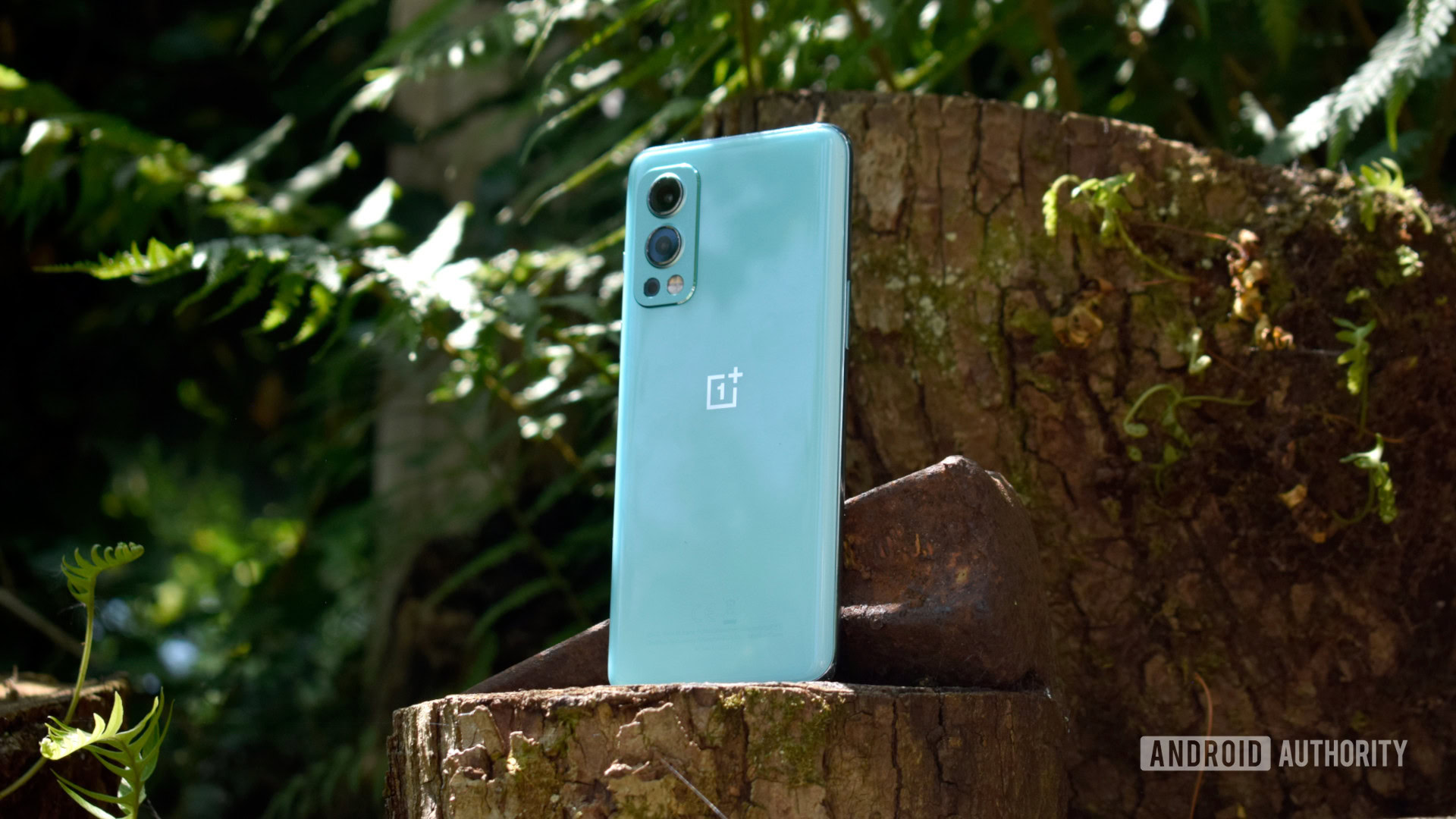
Despite the significant improvement in specs, OnePlus isn’t charging much of a premium for the Nord 2. Most buyers should be perfectly satisfied with the mid-range variant with 8GB of RAM. From a hardware point of view, the phone offers a significant amount of value (unless you go for the 12GB option, but that’s overkill). It’s the software longevity and the reliance on patches to fix those camera issues that pose concerns despite OnePlus having a decent track record of making good on updates.
The Samsung A52 5G (Rs. 23,999/$299/) presents itself as a credible option with its well-rounded software, quality cameras, and the promise of three years of software updates. The Snapdragon 750G on offer isn’t the most powerful around but does the trick for day-to-day use.
Related: The best phones under £500 | The best phones under 40,000 rupees
Elsewhere, the Pixel 4a 5G ($499/£499) is a little more pricey but has long been a fan-favorite, and for good reason too. The phone marries an affordable price with good enough specs and flagship-grade imaging. It also still has two years of support and, because it’s a Pixel, you’ll get lightning-quick updates. If you want to go cheaper, the Pixel 4a (£349) is still a great budget buy too with its amazing single camera, but it won’t hold up elsewhere on performance or features.
Yes, I’m recommending an iPhone as an alternative to an Android device, but hear me out. The iPhone SE ($400/£399/Rs. 28,400) is powered by the same overpowered A13 Bionic chipset as last year’s iPhones, making it one of the most powerful phones at its price. Moreover, the iOS app ecosystem is pretty darn hard to beat, though Android die-hards may need some time to adjust.
Despite the upgrades, OnePlus isn’t charging much of a premium for the Nord 2. Yet there are some fearsome alternatives to consider before you buy.
There’s also the POCO F3 (£339) which balances a powerful Snapdragon 870 chipset with a 120Hz display, large battery, fast charging, and a significantly lower price tag, though the overall software experience isn’t as refined.
Another beefy alternative to the OnePlus Nord 2 is the upcoming POCO F3 GT that coincidently launches in India just a day after the launch of the Nord. It’s a remarkably similar phone with most of the same underpinnings. However, the addition of a 120Hz OLED screen, larger battery, IP53 rating, and the surprisingly cool retractable shoulder buttons for gaming make it a noteworthy option.
Indian buyers can also look at the Xiaomi Mi 11x (Rs. 29,999) that gives you a bit more power with the Snapdragon 870 chipset and a significantly better imaging experience.
And finally, if you can stomach the price increase, the vanilla OnePlus 9 (£629/€699/Rs. 49,999) isn’t all that far off the Nord 2’s asking price, especially if you’re considering the 12GB model. The upgrades you get are well worth the extra cash if you’re sold on the OnePlus experience, but also have camera quality at the top of your wishlist.
OnePlus Nord 2 review: The verdict
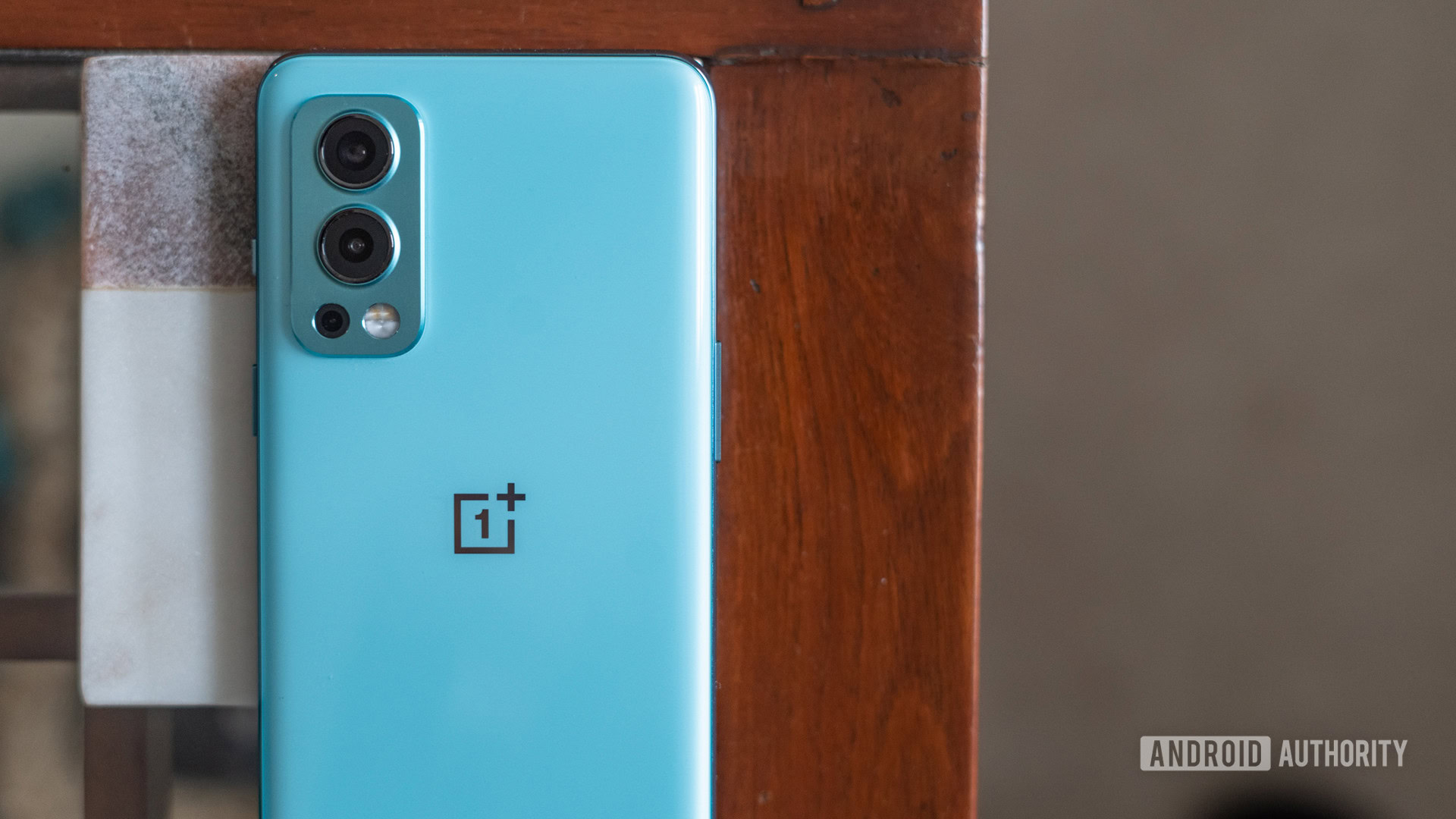
The OnePlus Nord 2 is a reasonable step forward for the brand’s mid-range strategy after a few side-steps and stumbles. I like how well the phone fits within the broader line-up of OnePlus phones. The basics are all here and there’s little to fault with the hardware. Sure, it is a foolhardy endeavor to try using the phone full throttle, but most users will be more than satisfied with the optimized experience on offer.
My main gripe with the phone is a classic OnePlus issue, and that’s underbaked imaging at launch. The camera software just does not match up to the promising hardware, and that’s a big miss out of the gates.
While the OnePlus Nord 2 has all the hardware in place to make it a hit, the cameras fail to hit a home run.
The hardware proposition here offers nothing unique — the key differentiator is the software experience. Unfortunately, Oxygen OS on its own isn’t nearly enough and OnePlus simply can’t afford to be complacent on essentials like the camera. The mid-range segment in Europe and India is crowded with big hitters and unlike the flagship territory, OnePlus is far from the only affordable option.
All in all, the OnePlus Nord 2 is a pretty good phone with decent hardware credentials and a premium look, but just not enough to be a stand-out for a strong recommendation amidst a sea of competitors vying for buyer attention.